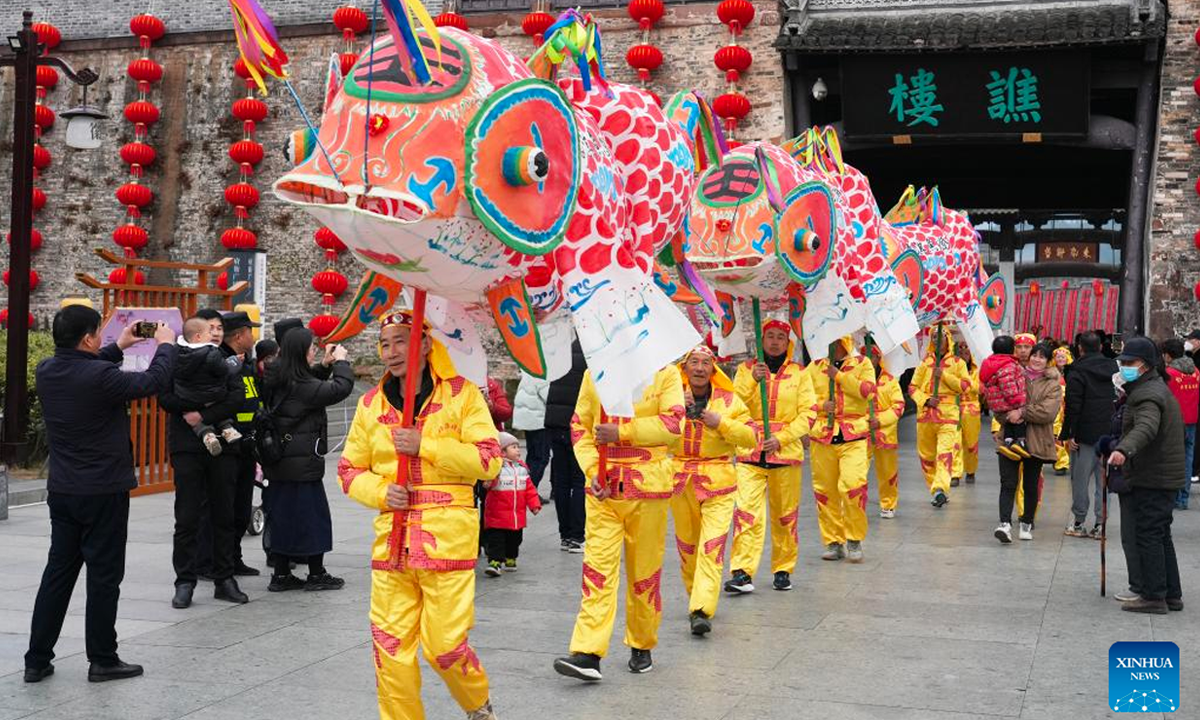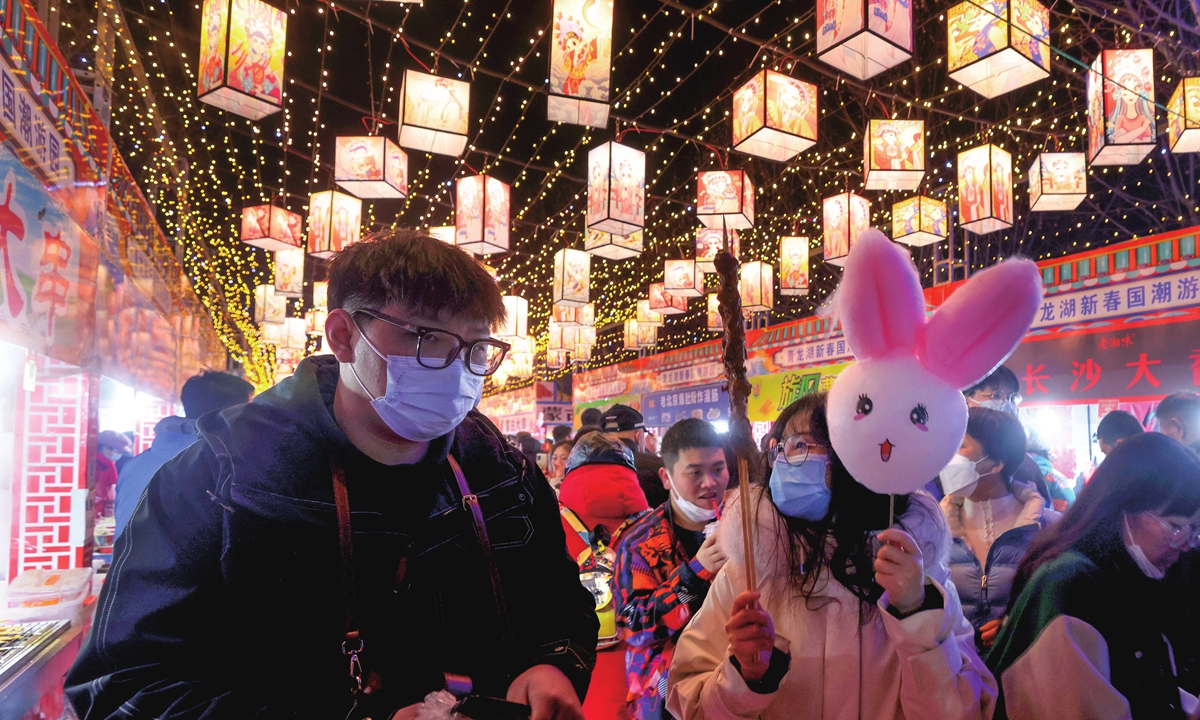
Folk artists holding fish-shaped lanterns perform at Shexian County in Huangshan, east China's Anhui Province, Feb 4, 2023. The Lantern Festival, the 15th day of the first month of the Chinese lunar calendar, falls on Feb 5 this year. Various folk cultural activities were held across the country to welcome the upcoming festival. Photo: Xinhua
From surging tourism orders and movie box office during the Spring Festival holidays to rising spending on festival products and food for Lantern Festival, holiday shopping boom is prolonged and stronger at the beginning of the Year of the Rabbit in China, as people celebrate keenly while the epidemic has largely come to an end and the domestic economy has showed multiple signs of promising growth.
The Lantern Festival, which fell on Sunday this year, is a festive day where people usually eat sweet dumpling, or yuanxiao, a kind of glutinous rice ball, and watch lantern show as traditional Chinese culture.
Spending over the one-day festival usually is not very strong compared with other longer festivals, but this year it is surprisingly produce another big buying spree, with Chinese residents generously spending money not only on goods related to this festival, but also on eating out, tourism and other entertainment activities.
Lantern buying spree
The Global Times on Saturday visited the Chenghuang Temple in Shanghai where a lantern show was held. The tourism site was crowded with people with almost every restaurant having a long queue of customers waiting for tables.
It took at least two to three hours for tourists to line up and reach the major attraction site of Jiuqu Bridge at the center of the tourism spot, which in normal times is just minutes' walk from the entrance, a vivid reflection of tourism heat around the Lantern Festival holiday.
A lantern maker based in Jinhua, Zhejiang Province, told the Global Times on Sunday that their sales have been much stronger than last year as the pent-up demand unleashed after downgraded epidemic response.
"We have sold over 100,000 units of lanterns, mostly themed rabbit or moon, the zodiac animal of the Chinese Lunar Year of 2023, in January, which was a strong rebound compared with just around 40,000 in the same period last year," the company's manager said.
The lanterns for home decoration are mostly for the domestic market, but they are also looking into overseas market, particularly the neighboring Southeast Asian countries where the Chinese traditional festivals like the Lantern Festival is also popular.
An employee from a Beijing-based online vendor selling sweet dumplings also said that they offered yuanxiao with a great variety of flavors from the traditional nuts to chocolate and blueberry flavors.
"The sales boom has started a week ahead, and it's much hotter than last year," the person told the Global Times.
Meanwhile, data collected by multiple domestic e-commerce websites also showed that consumption during this year's Lantern Festival holiday was particularly heated.
According to a recent report sent by Alibaba to the Global Times, searches for "yuanxiao" on Tmall Supermarket has surged by 150 percent in the past week compared with the previous week, while sales of the food also surged three times compared with last year.
Besides, data revealed by Meituan showed that sales volume of lanterns surged by 130 percent compared with the previous year, while ticket reservations for tourism spots that are related to Lantern Festival keywords like lantern show surged by around 380 percent in the recent week.
The boom in Lantern Festival shopping is an extension of the buying spree during the Spring Festival holidays, which saw a 23 percent increase in domestic tourism travels and 11.89 rise in movie box office.
Li Changan, a professor from the University of International Business and Economics, told the Global Times on Sunday that the booming consumption is a natural phenomenon that is within expectation as the country is ramping up efforts for economic recovery after three years of the epidemic, which curbed market demand.
"This is a good start, because consumption, as an important force driving economic growth, is now a very important part of expanding domestic demand and plays a very important role in stabilizing growth and meeting the economic development targets for this year," Li said.
Yue Xiangyu, an analyst at the Shanghai University of Finance and Economics, told the Global Times that the "long-tail effect" of China's recent consumption boom could be a signal that Chinese people's shopping enthusiasm could last a relatively long period of time, which is a "positive" sign.
"The recent holiday consumption passion is helpful for lifting medium/small enterprises' confidence in the Chinese economy and increase residents' income, which in turn boosts consumption for the whole year," Yue told the Global Times on Sunday.
He predicted that China's consumption revenues could grow by about 8 percent this year, compared with a 0.2 percent drop in 2022.

Residents in Beijing watch lantern show and visit fairs on February 5, 2023. The Lantern Festival falls on the 15th day of the first month on Chinese lunar calendar, also marks the end of Spring Festival celebrations. Photo: VCG
Economic rise
Seen from a larger context, the consumption boom is one of the positive signs that signal a sound economic recovery in China this year. According to data released by the National Bureau of Statistics, China's official manufacturing purchasing managers' index (PMI) bounced back into the expansion territory in January for the first time since last September, signaling a strong rebound in the production sector.
Local governments in China are also beefing up efforts to stimulate economy. At the first meeting convened by local governments in the Year of the Rabbit, most provinces and cities came up with their solutions of promoting local economy.
For example, Liuyang of Central China's Hunan Province rolled out 10 measures to promote high-quality development of private economy during the meeting, as well as awarded 871 private enterprises with 100 million yuan ($14.76 million) in total.
Yue said that local governments are trying to make up for the losses caused by anti-virus curbs and push economic work back to the normal track by promoting real economy and employment. He said that market projections for this year's China GDP growth stands at about 5.2 percent on average. "I'm personally a bit more optimistic than the average expectations," he said.
In addition, both the real estate sector and the platform economy have been in a state of rectification in recent years, and now the related works have basically come to an end, it may further release the growth potential of the leading engines of economic growth, and bring about a greater boost to the annual economic growth, Li said.





